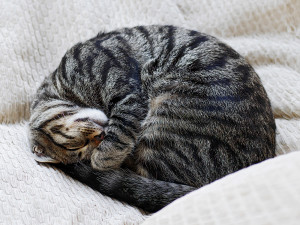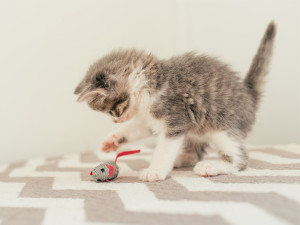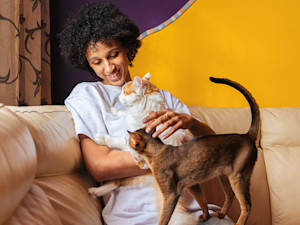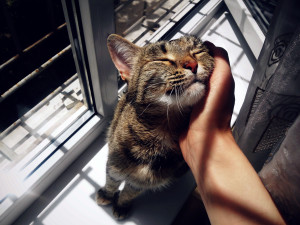Why Did My Cat Bite Me?
Don’t live in fear of your feline overlord. A vet explains why cats bite (and what you can do to avoid their wrath)
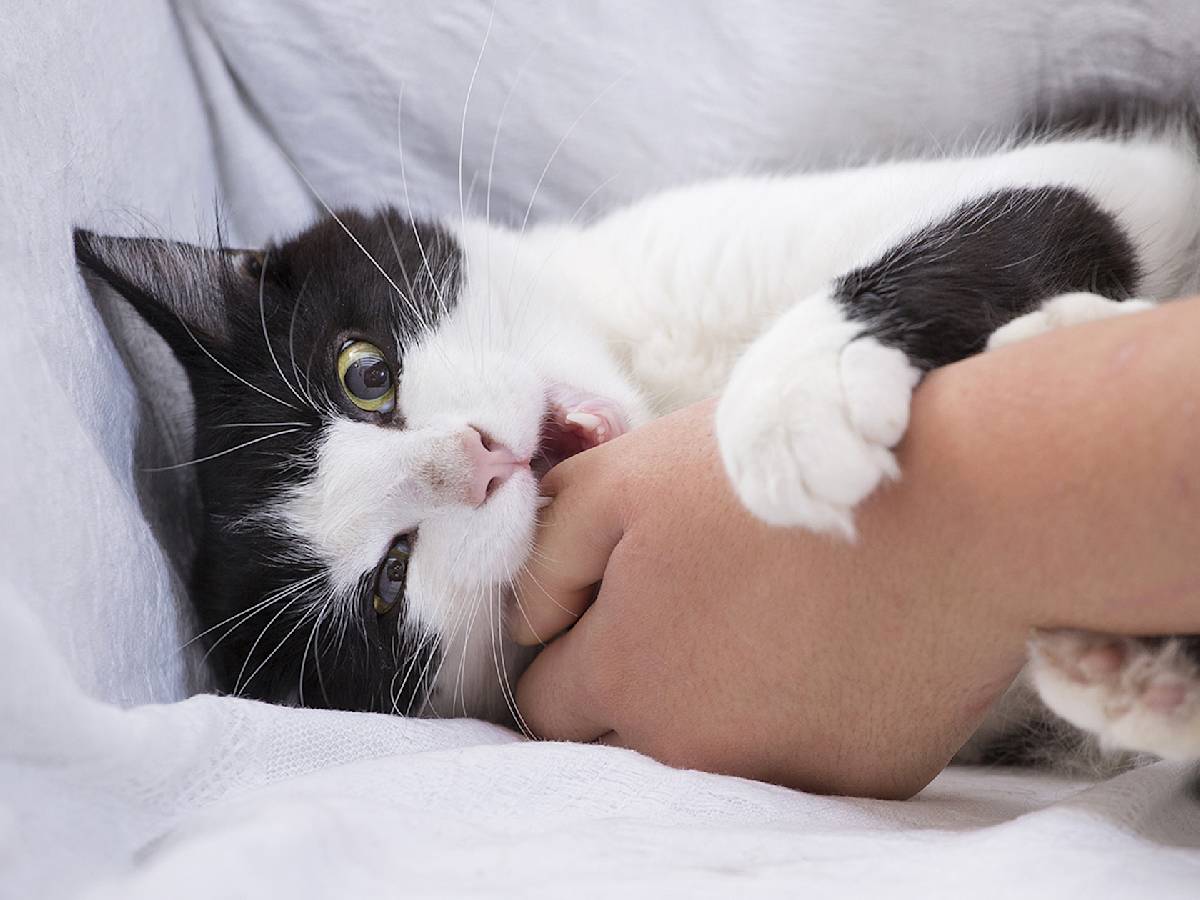
Share Article
We’ve all been there – you’re on the sofa binge-watching Love Island, stroking the seemingly contented creature in your lap, then: ‘Ouch! Did my cat just bite me?’
It’s hard not to take your cat’s treachery personally but – trust us – it’s not you. It’s not uncommon for cats to get overstimulated by over-stroking, which can cause a build-up of stress hormones and static electricity. (As a rule, cats tend to prefer being stroked around the head and neck; attempt long body strokes at your own risk.) And just like people, cats have affection thresholds, especially rescue cats that may never have known human touch and can only tolerate so much. Instead of overthinking their mixed messages, read on to understand what unnerved them in the first place.
Read your cat’s body language
Cats use body language to communicate how they feel, and chances are your cat gave you some warning signs before biting – however subtle those signals were. “We have to remember that our verbal communication is quite different from that of our animal counterparts,” says vet Dr Caity Flint. “They rely much more on non-verbal cues. When those cues are ignored or misunderstood, the end result may be aggression or sharper warnings.” So how do you know when your cat has had enough? General restlessness is the first sign that something is wrong. A twitching tail, flattening of the ears, rippling skin and a soul-crushing death stare will follow if you don’t take the hint.
Consider your cat’s health
Your cat’s health might also affect how they react to your touch. If they’re elderly, stroking can exacerbate arthritic pain. Dental and skin issues might also make your cat cranky and hyper-sensitive to contact. If your cat has previously enjoyed being stroked and this is a new behaviour, it’s worth taking them to the vet to make sure there isn’t a health concern behind the biting. “Your vet can help you rule out medical causes and create a plan to try and correct the behaviour if necessary,” says Dr Flint. “If all else fails, your vet may refer you to a behaviourist.”
Ease up on rough play
It’s tempting to roughhouse with your little tiger, but if you don’t set boundaries first, play fighting can quickly escalate into aggression, and that behaviour can bleed over into other interactions with your cat. “It’s common for many pet owners to utilise their hands, especially with kittens, when playing or roughhousing. This type of play can teach your pet to see your hands as toys or reinforce the idea that the way to receive attention is to play fight,” says Dr Flint. “It is important from a young age to always use toys and not hands.”
Take your cat’s cue
With both our hands and our pride wounded, it’s easy to react negatively, but take a moment and think things over. Yelling or physically responding will only justify – to your cat – the act of biting you to begin with. Instead, stop stroking your cat and give them time to relax and recalibrate. “Learn your cat’s likes, dislikes and triggers,” says Dr Flint. “From there, you can begin to determine what may have caused the aggression and what you can do to avoid it in the future.” If this is a common occurrence, you can use positive reinforcement to warm them to your touch and strengthen your bond. And the best way to their heart is through their stomach, so pair strokes with treats, then slowly but surely increase stroking times as they become more comfortable with it.

Bailey Freeman
Bailey Freeman lives in Nashville, TN, where she works as a freelance writer, editor, content creator, and circus artist. You didn't read that wrong — when she's not writing about the world around her, she works as an aerialist and instructor (in a circus tent and everything). She's also a big fan of travel, the outdoors, and neon hair dye.
Related articles
![A kitten playing with a mouse cat toy.]()
How to Keep Your Kitten From Making You the Toy at Playtime
Your cat deserves to play, but you deserve to walk away unscathed
![Black cat staring at a cat toy]()
How to Play With Your Cat
Cat behaviourist Cristin Tamburo’s got a game plan
![Cheerful Black Woman Caressing Cats On Couch]()
30 Strange Signs My Cat Is Happy
From puking on your least favourite shoes to biting you less (not zero, just less), here are all the ways to tell if your cat is actually happy
![Two black cats staring out window.]()
5 Signs You Should Get Your Cat a Cat
Because 8 paws are better than 4 when it comes to pushing stuff off the table
![Black cat staring at a cat toy]()
How to Play With Your Cat
Cat behaviourist Cristin Tamburo’s got a game plan
![Cat being happily pet in the sunshine of a window]()
How to Stroke a Cat (Without a Scratch)
There is a right and wrong way

